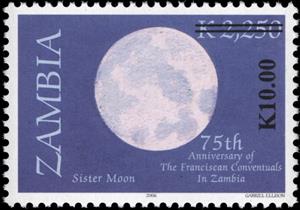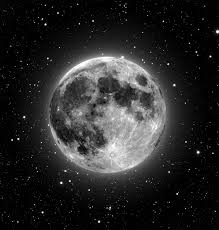Stamp: 75th Anniversary of Franciscan Conventuals Surcharged (Zambia 2024)
75th Anniversary of Franciscan Conventuals Surcharged (Zambia 2024)
01 January (Zambia ) within release Religions & beliefs (Christianity) goes into circulation Stamp 75th Anniversary of Franciscan Conventuals Surcharged face value 10 Zambian kwacha
| Stamp 75th Anniversary of Franciscan Conventuals Surcharged in catalogues | |
|---|---|
| Colnect codes: | Col: ZM 2024.00.00-01 |
Stamp is horizontal format.
Stamp 75th Anniversary of Franciscan Conventuals Surcharged it reflects the thematic directions:
The Moon is Earth's only natural satellite. It orbits at an average distance of 384,400 km (238,900 mi), about 30 times the diameter of Earth. Tidal forces between Earth and the Moon have over time synchronized the Moon's orbital period (lunar month) with its rotation period (lunar day) at 29.5 Earth days, causing the same side of the Moon to always face Earth. The Moon's gravitational pull – and to a lesser extent, the Sun's – are the main drivers of Earth's tides.
Religion is any cultural system of designated behaviors and practices, world views, texts, sanctified places, ethics, or organizations, that relate humanity to the supernatural or transcendental. Religions relate humanity to what anthropologist Clifford Geertz has referred to as a cosmic "order of existence". Different religions may or may not contain various elements ranging from the "divine", "sacred things", "faith", a "supernatural being or supernatural beings" or "some sort of ultimacy and transcendence that will provide norms and power for the rest of life". Religious practices may include rituals, sermons, commemoration or veneration (of deities), sacrifices, festivals, feasts, trances, initiations, funerary services, matrimonial services, meditation, prayer, music, art, dance, public service, or other aspects of human culture. Religions have sacred histories and narratives, which may be preserved in sacred scriptures, and symbols and holy places, that aim mostly to give a meaning to life. Religions may contain symbolic stories, which are sometimes said by followers to be true, that have the side purpose of explaining the origin of life, the Universe and other things. Traditionally, faith, in addition to reason, has been considered a source of religious beliefs. There are an estimated 10,000 distinct religions worldwide. About 84% of the world's population is affiliated with one of the five largest religions, namely Christianity, Islam, Hinduism, Buddhism or forms of folk religion.


